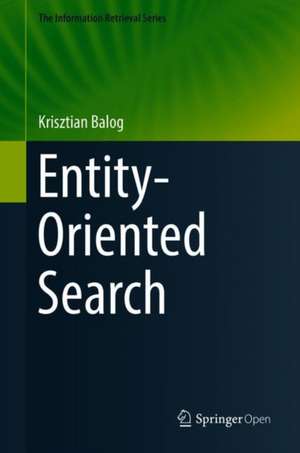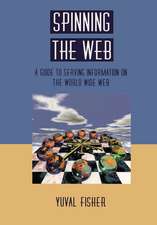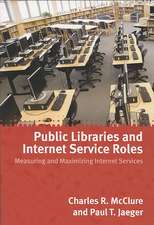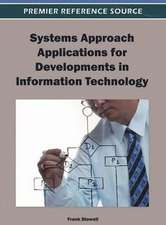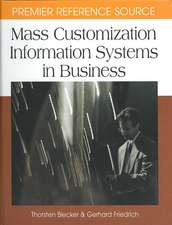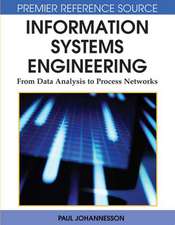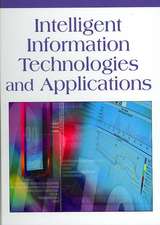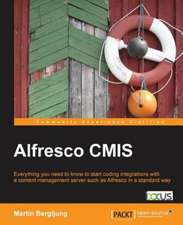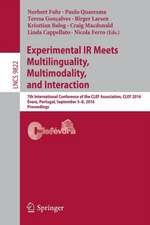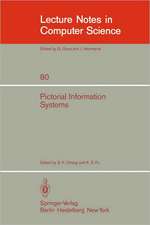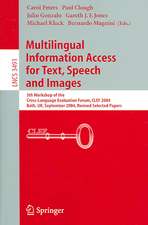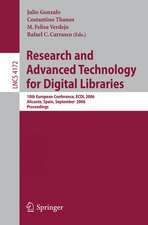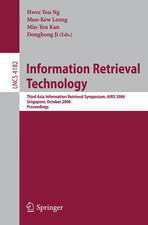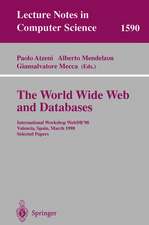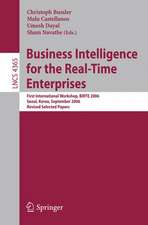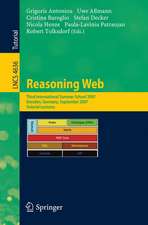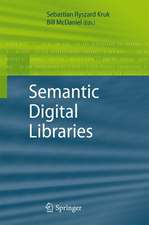Entity-Oriented Search: The Information Retrieval Series, cartea 39
Autor Krisztian Balogen Limba Engleză Hardback – 16 oct 2018
This open access book covers all facets of entity-oriented search—where “search” can be interpreted in the broadest sense of information access—from a unified point of view, and provides a coherent and comprehensive overview of the state of the art. It represents the first synthesis of research in this broad and rapidly developing area. Selected topics are discussed in-depth, the goal being to establish fundamental techniques and methods as a basis for future research and development. Additional topics are treated at a survey level only, containing numerous pointers to the relevant literature. A roadmap for future research, based on open issues and challenges identified along the way, rounds out the book.
Researchers and graduate students are the primary target audience of this book. A general background in information retrieval is sufficient to follow the material, including an understanding of basic probability and statistics concepts as well as a basic knowledge of machine learning concepts and supervised learning algorithms.
| Toate formatele și edițiile | Preț | Express |
|---|---|---|
| Paperback (1) | 366.38 lei 6-8 săpt. | |
| Springer International Publishing – 20 dec 2018 | 366.38 lei 6-8 săpt. | |
| Hardback (1) | 371.97 lei 6-8 săpt. | |
| Springer International Publishing – 16 oct 2018 | 371.97 lei 6-8 săpt. |
Din seria The Information Retrieval Series
- 20%
 Preț: 1902.51 lei
Preț: 1902.51 lei - 20%
 Preț: 651.89 lei
Preț: 651.89 lei - 20%
 Preț: 982.70 lei
Preț: 982.70 lei - 20%
 Preț: 646.80 lei
Preț: 646.80 lei - 20%
 Preț: 2189.11 lei
Preț: 2189.11 lei - 20%
 Preț: 652.22 lei
Preț: 652.22 lei - 15%
 Preț: 642.18 lei
Preț: 642.18 lei - 20%
 Preț: 1900.73 lei
Preț: 1900.73 lei - 20%
 Preț: 652.41 lei
Preț: 652.41 lei - 20%
 Preț: 647.79 lei
Preț: 647.79 lei - 20%
 Preț: 944.77 lei
Preț: 944.77 lei - 20%
 Preț: 652.07 lei
Preț: 652.07 lei - 20%
 Preț: 1444.03 lei
Preț: 1444.03 lei - 20%
 Preț: 990.12 lei
Preț: 990.12 lei - 15%
 Preț: 644.82 lei
Preț: 644.82 lei - 20%
 Preț: 646.95 lei
Preț: 646.95 lei - 20%
 Preț: 653.56 lei
Preț: 653.56 lei - 20%
 Preț: 768.06 lei
Preț: 768.06 lei - 20%
 Preț: 648.59 lei
Preț: 648.59 lei - 20%
 Preț: 648.59 lei
Preț: 648.59 lei - 20%
 Preț: 326.64 lei
Preț: 326.64 lei - 20%
 Preț: 776.69 lei
Preț: 776.69 lei - 20%
 Preț: 1276.08 lei
Preț: 1276.08 lei - 20%
 Preț: 697.27 lei
Preț: 697.27 lei - 20%
 Preț: 335.52 lei
Preț: 335.52 lei - 20%
 Preț: 658.98 lei
Preț: 658.98 lei - 20%
 Preț: 646.12 lei
Preț: 646.12 lei
Preț: 371.97 lei
Preț vechi: 464.97 lei
-20% Nou
Puncte Express: 558
Preț estimativ în valută:
71.17€ • 74.51$ • 58.89£
71.17€ • 74.51$ • 58.89£
Carte tipărită la comandă
Livrare economică 05-19 aprilie
Preluare comenzi: 021 569.72.76
Specificații
ISBN-13: 9783319939339
ISBN-10: 3319939335
Pagini: 432
Ilustrații: XIX, 351 p. 86 illus., 13 illus. in color.
Dimensiuni: 155 x 235 mm
Greutate: 0.72 kg
Ediția:1st ed. 2018
Editura: Springer International Publishing
Colecția Springer
Seria The Information Retrieval Series
Locul publicării:Cham, Switzerland
ISBN-10: 3319939335
Pagini: 432
Ilustrații: XIX, 351 p. 86 illus., 13 illus. in color.
Dimensiuni: 155 x 235 mm
Greutate: 0.72 kg
Ediția:1st ed. 2018
Editura: Springer International Publishing
Colecția Springer
Seria The Information Retrieval Series
Locul publicării:Cham, Switzerland
Cuprins
1 Introduction.- 2 Meet the Data.- 3 Term-Based Models for Entity Ranking.- 4 Semantically Enriched Models for Entity Ranking.- 5 Entity Linking.- 6 Populating Knowledge Bases.- 7 Understanding Information Needs.- 8 Leveraging Entities in Document Retrieval.- 9 Utilizing Entities for an Enhanced Search Experience.- 10 Conclusions and Future Directions.
Notă biografică
Krisztian Balog is a full professor of Computer Science, heading the Information Access and Interaction (IAI) group at the Department of Electrical Engineering and Computer Science at the University of Stavanger. His general research interests lie in the use and development of information retrieval, information extraction, and machine learning techniques for intelligent information access tasks, and his current emphasis is on entity-oriented and semantic search, and novel evaluation methodologies. His work on entity retrieval has been very influential and has received numerous awards.
Textul de pe ultima copertă
This open access book covers all facets of entity-oriented search—where “search” can be interpreted in the broadest sense of information access—from a unified point of view, and provides a coherent and comprehensive overview of the state of the art. It represents the first synthesis of research in this broad and rapidly developing area. Selected topics are discussed in-depth, the goal being to establish fundamental techniques and methods as a basis for future research and development. Additional topics are treated at a survey level only, containing numerous pointers to the relevant literature. A roadmap for future research, based on open issues and challenges identified along the way, rounds out the book.
Researchers and graduate students are the primary target audience of this book. A general background in information retrieval is sufficient to follow the material, including an understanding of basic probability and statistics concepts as well as a basic knowledge of machine learning concepts and supervised learning algorithms.
Caracteristici
The first book on a rapidly developing area, providing a coherent and comprehensive overview of the state of the art Details how entities can bridge the gap between unstructured and structured data for search Shows how entity search can provide the basis for semantic search with rich and focused query responses
